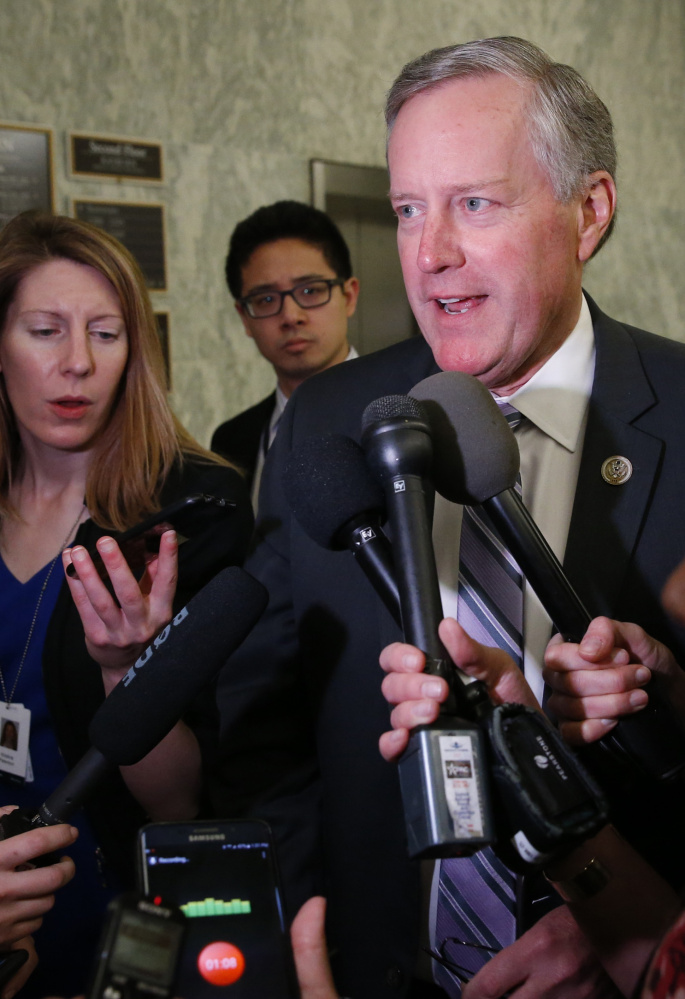WASHINGTON — As their counterparts in the Senate struggled Tuesday to advance a high-profile health-care bill, House Republicans confronted their own critical failure to agree on a fiscal 2018 budget resolution.
Passing a budget is about much more than next year’s spending for Republican lawmakers. It also sets the stage for special budget procedures – known as reconciliation instructions – that will allow Republicans to pass major legislation without a filibuster from Senate Democrats.
But even the promise of tax reform and long-term spending cuts has not yet been enough to bring a fractious group of House Republicans together. A scheduled Thursday meeting of the House Budget Committee to prepare a budget resolution for a floor vote was canceled Tuesday amid continued infighting.
Rep. Steve Womack, R-Ark., a Budget Committee member, lamented Tuesday that the budget “should have been put to bed a long time ago.”
“It’s almost like we’re serving in the minority right now,” he said. “We just simply don’t know how to govern.”
House leaders struck an optimistic note last week after Republican defense hawks and deficit hawks appeared to agree on a compromise figure of $621 billion for defense spending in fiscal 2018. But another thorny issue has derailed the talks: how much entitlement spending to trim from the federal budget over the coming decade.
Most Budget Committee Republicans are prepared to trim $200 billion from the federal budget over 10 years, but hard-line conservatives are pushing for even more cuts to federal spending that now totals roughly $4 trillion a year.
Rep. Mark Meadows, R-N.C., chairman of the House Freedom Caucus, said he has personally identified $300 billion of potential cuts to mandatory spending – programs such as Medicare and Medicaid that are not appropriated on a regular basis by Congress. In particular, he said, conservatives want cuts to the federal Supplemental Nutrition Assistance Program – food stamps – as well as Temporary Assistance for Needy Families, the main welfare program.
“To suggest that there’s no waste or inefficiencies in those areas would defy history,” he said.
But the chairmen of the House committees that would be charged with wringing out those inefficiencies are balking at being essentially ordered around by the Budget Committee, and that has talks in a fresh stalemate as a week-long July 4 holiday recess approaches. Under the typical yearly budget cycle, the House and Senate pass a budget resolution by April 15.
Budget Committee spokesman Will Allison said the panel’s chairman, Rep. Diane Black, R-Tenn., “is 100 percent committed to getting a budget done” and “plans to keep this process moving after the July 4th recess.”
House Minority Leader Nancy Pelosi, D-Calif., on Tuesday attacked what she described as the Republicans’ fiscal irresponsibility.
“Almost five months into the Trump Administration, House Republicans still haven’t met their most basic responsibility to pass a budget,” she said in a statement. “Time is quickly running out to … avert a catastrophic default on the debt.”
Send questions/comments to the editors.



Success. Please wait for the page to reload. If the page does not reload within 5 seconds, please refresh the page.
Enter your email and password to access comments.
Hi, to comment on stories you must . This profile is in addition to your subscription and website login.
Already have a commenting profile? .
Invalid username/password.
Please check your email to confirm and complete your registration.
Only subscribers are eligible to post comments. Please subscribe or login first for digital access. Here’s why.
Use the form below to reset your password. When you've submitted your account email, we will send an email with a reset code.